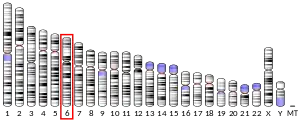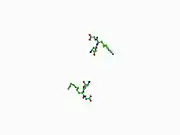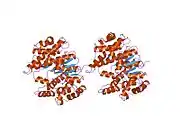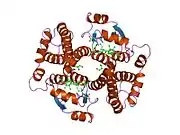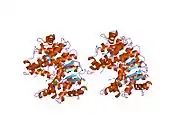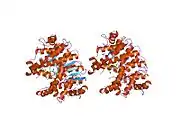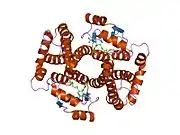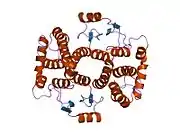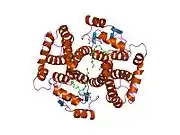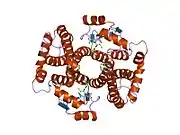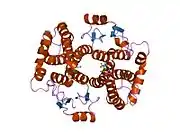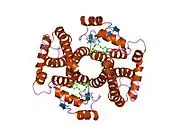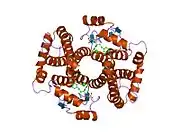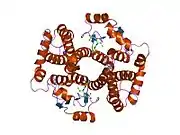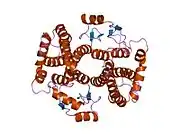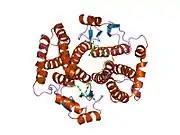GSTA2
Glutathione S-transferase A2 is an enzyme that in humans is encoded by the GSTA2 gene.[3]
| GSTA2 | |||||||||||||||||||||||||||||||||||||||||||||||||||
|---|---|---|---|---|---|---|---|---|---|---|---|---|---|---|---|---|---|---|---|---|---|---|---|---|---|---|---|---|---|---|---|---|---|---|---|---|---|---|---|---|---|---|---|---|---|---|---|---|---|---|---|
| |||||||||||||||||||||||||||||||||||||||||||||||||||
| Identifiers | |||||||||||||||||||||||||||||||||||||||||||||||||||
| Aliases | GSTA2, GST2, GSTA2-2, GTA2, GTH2, glutathione S-transferase alpha 2 | ||||||||||||||||||||||||||||||||||||||||||||||||||
| External IDs | OMIM: 138360 HomoloGene: 47952 GeneCards: GSTA2 | ||||||||||||||||||||||||||||||||||||||||||||||||||
| |||||||||||||||||||||||||||||||||||||||||||||||||||
| |||||||||||||||||||||||||||||||||||||||||||||||||||
| |||||||||||||||||||||||||||||||||||||||||||||||||||
| |||||||||||||||||||||||||||||||||||||||||||||||||||
| Wikidata | |||||||||||||||||||||||||||||||||||||||||||||||||||
| |||||||||||||||||||||||||||||||||||||||||||||||||||
Cytosolic and membrane-bound forms of glutathione S-transferase are encoded by two distinct supergene families. These enzymes function in the detoxification of electrophilic compounds, including carcinogens, therapeutic drugs, environmental toxins and products of oxidative stress, by conjugation with glutathione. The genes encoding these enzymes are known to be highly polymorphic. These genetic variations can change an individual's susceptibility to carcinogens and toxins as well as affect the toxicity and efficacy of some drugs. At present, eight distinct classes of the soluble cytoplasmic mammalian glutathione S-transferases have been identified: alpha, kappa, mu, omega, pi, sigma, theta and zeta. This gene encodes a glutathione S-transferase belonging to the alpha class. The alpha class genes, located in a cluster mapped to chromosome 6, are the most abundantly expressed glutathione S-transferases in liver. In addition to metabolizing bilirubin and certain anti-cancer drugs in the liver, the alpha class of these enzymes exhibit glutathione peroxidase activity thereby protecting the cells from reactive oxygen species and the products of peroxidation.[3]
References
- GRCh38: Ensembl release 89: ENSG00000244067 - Ensembl, May 2017
- "Human PubMed Reference:". National Center for Biotechnology Information, U.S. National Library of Medicine.
- "Entrez Gene: GSTA2 glutathione S-transferase A2".
Further reading
- Röhrdanz E, Nguyen T, Pickett CB (1992). "Isolation and characterization of the human glutathione S-transferase A2 subunit gene". Arch. Biochem. Biophys. 298 (2): 747–52. doi:10.1016/0003-9861(92)90475-C. PMID 1329668.
- Stenberg G, Björnestedt R, Mannervik B (1992). "Heterologous expression of recombinant human glutathione transferase A1-1 from a hepatoma cell line". Protein Expr. Purif. 3 (1): 80–4. doi:10.1016/1046-5928(92)90060-A. PMID 1330133.
- Klöne A, Hussnätter R, Sies H (1992). "Cloning, sequencing and characterization of the human alpha glutathione S-transferase gene corresponding to the cDNA clone pGTH2". Biochem. J. 285 (3): 925–8. doi:10.1042/bj2850925. PMC 1132883. PMID 1497629.
- Bogaards JJ, van Ommen B, van Bladeren PJ (1992). "Purification and characterization of eight glutathione S-transferase isoenzymes of hamster. Comparison of subunit composition of enzymes from liver, kidney, testis, pancreas and trachea". Biochem. J. 286 (2): 383–8. doi:10.1042/bj2860383. PMC 1132909. PMID 1530570.
- Strange RC, Fryer AA, Matharoo B, et al. (1992). "The human glutathione S-transferases: comparison of isoenzyme expression in normal and astrocytoma brain". Biochim. Biophys. Acta. 1139 (3): 222–8. doi:10.1016/0925-4439(92)90138-D. PMID 1627661.
- Hayes JD, Kerr LA, Cronshaw AD (1990). "Evidence that glutathione S-transferases B1B1 and B2B2 are the products of separate genes and that their expression in human liver is subject to inter-individual variation. Molecular relationships between the B1 and B2 subunits and other Alpha class glutathione S-transferases". Biochem. J. 264 (2): 437–45. doi:10.1042/bj2640437. PMC 1133600. PMID 2604726.
- Board PG, Webb GC (1987). "Isolation of a cDNA clone and localization of human glutathione S-transferase 2 genes to chromosome band 6p12". Proc. Natl. Acad. Sci. U.S.A. 84 (8): 2377–81. Bibcode:1987PNAS...84.2377B. doi:10.1073/pnas.84.8.2377. PMC 304654. PMID 3031680.
- Rhoads DM, Zarlengo RP, Tu CP (1987). "The basic glutathione S-transferases from human livers are products of separate genes". Biochem. Biophys. Res. Commun. 145 (1): 474–81. doi:10.1016/0006-291X(87)91345-3. PMID 3036131.
- Chow NW, Whang-Peng J, Kao-Shan CS, et al. (1988). "Human glutathione S-transferases. The Ha multigene family encodes products of different but overlapping substrate specificities". J. Biol. Chem. 263 (26): 12797–800. doi:10.1016/S0021-9258(18)37626-9. PMID 3138230.
- Tu CP, Qian B (1988). "Nucleotide sequence of the human liver glutathione S-transferase subunit 1 cDNA". Biochem. Soc. Trans. 15 (4): 734–6. doi:10.1042/bst0150734. PMID 3678589.
- Tu CP, Qian B (1987). "Human liver glutathione S-transferases: complete primary sequence of an Ha subunit cDNA". Biochem. Biophys. Res. Commun. 141 (1): 229–37. doi:10.1016/S0006-291X(86)80358-8. PMID 3800996.
- Satoh K, Kitahara A, Sato K (1985). "Identification of heterogeneous and microheterogeneous subunits of glutathione S-transferase in rat liver cytosol". Arch. Biochem. Biophys. 242 (1): 104–11. doi:10.1016/0003-9861(85)90484-9. PMID 3901925.
- Zeng K, Rose JP, Chen HC, et al. (1995). "A surface mutant (G82R) of a human alpha-glutathione S-transferase shows decreased thermal stability and a new mode of molecular association in the crystal". Proteins. 20 (3): 259–63. doi:10.1002/prot.340200306. PMID 7892174. S2CID 10910971.
- Anttila S, Hirvonen A, Vainio H, et al. (1994). "Immunohistochemical localization of glutathione S-transferases in human lung". Cancer Res. 53 (23): 5643–8. PMID 8242618.
- Suzuki T, Johnston PN, Board PG (1994). "Structure and organization of the human alpha class glutathione S-transferase genes and related pseudogenes". Genomics. 18 (3): 680–6. doi:10.1016/S0888-7543(05)80373-8. PMID 8307579.
- Ahmad H, Singhal SS, Saxena M, Awasthi YC (1993). "Characterization of two novel subunits of the alpha-class glutathione S-transferases of human liver". Biochim. Biophys. Acta. 1161 (2–3): 333–6. doi:10.1016/0167-4838(93)90234-i. PMID 8431482.
- Rowe JD, Nieves E, Listowsky I (1997). "Subunit diversity and tissue distribution of human glutathione S-transferases: interpretations based on electrospray ionization-MS and peptide sequence-specific antisera". Biochem. J. 325 (2): 481–6. doi:10.1042/bj3250481. PMC 1218585. PMID 9230131.
- Coles BF, Anderson KE, Doerge DR, et al. (2000). "Quantitative analysis of interindividual variation of glutathione S-transferase expression in human pancreas and the ambiguity of correlating genotype with phenotype". Cancer Res. 60 (3): 573–9. PMID 10676639.
- Tetlow N, Liu D, Board P (2001). "Polymorphism of human Alpha class glutathione transferases". Pharmacogenetics. 11 (7): 609–17. doi:10.1097/00008571-200110000-00007. PMID 11668220.
- Coles BF, Morel F, Rauch C, et al. (2002). "Effect of polymorphism in the human glutathione S-transferase A1 promoter on hepatic GSTA1 and GSTA2 expression". Pharmacogenetics. 11 (8): 663–9. doi:10.1097/00008571-200111000-00004. PMID 11692074.
